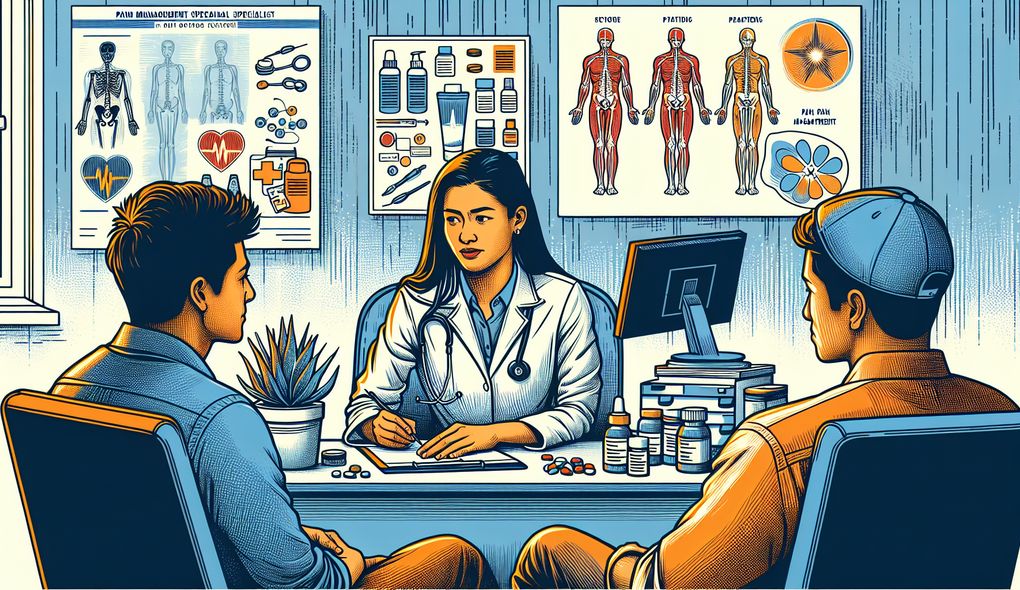What is your strategy for managing and balancing your workload as a Pain Management Specialist?
INTERMEDIATE LEVEL

Sample answer to the question:
My strategy for managing and balancing my workload as a Pain Management Specialist is to prioritize tasks and develop a schedule that allows me to efficiently allocate my time. I believe in setting realistic goals and deadlines for myself, and I am constantly evaluating and adjusting my schedule to ensure that I stay on track. Additionally, I understand the importance of collaboration and teamwork, so I actively communicate with my colleagues to ensure that we are all on the same page and can support each other when needed. Finally, I make it a priority to stay organized by maintaining detailed records of patients' treatment plans and progress, which helps me stay on top of my workload and ensure that I am providing the best care possible.
Here is a more solid answer:
As a Pain Management Specialist, managing and balancing my workload is crucial to ensure that I provide the best possible care to my patients. To do this, I prioritize my tasks based on the urgency and importance of each case. For example, if a patient requires immediate attention, such as a sudden increase in pain or a medication adjustment, I will address their needs first. Additionally, I carefully plan my schedule to allocate enough time for patient consultations, procedures, and administrative tasks. This allows me to maintain a balanced workload and avoid becoming overwhelmed. Furthermore, collaboration plays a vital role in managing my workload. I actively communicate with my colleagues, including physical therapists and psychiatrists, to coordinate care and ensure that we are all working towards the same goal of improving patient outcomes. By sharing information and insights, we can collectively manage the workload more effectively. Lastly, organization is key in pain management. I keep meticulous records of patients' treatment plans, progress, and medication regimens. This helps me stay organized and ensures that I can easily access the information I need to make informed decisions. Overall, my strategy for managing and balancing my workload revolves around prioritization, collaboration, and organization to deliver high-quality care to my patients.
Why is this a more solid answer?
The solid answer expands on the basic answer by providing specific examples and details to support the candidate's strategies for workload management. The answer emphasizes prioritization, planning, collaboration, and organization, which are all key skills required for the role. However, it could be further improved by including more information about the candidate's experience in pain management and how their strategies have led to positive outcomes.
An example of a exceptional answer:
My strategy for managing and balancing my workload as a Pain Management Specialist is multifaceted, incorporating various techniques to ensure optimal patient care. To begin, I employ a systematic approach to time management, carefully planning and allocating my time based on the urgency and acuity of each patient's condition. This involves regularly reviewing my patient caseload, identifying high-priority cases, and promptly addressing their needs. For example, if a patient reports a sudden exacerbation of pain, I prioritize them for immediate evaluation and intervention. Additionally, I leverage technology tools, such as electronic medical record systems, to streamline administrative tasks and maximize efficiency. Collaboration is another crucial aspect of my workload management strategy. I actively engage with my interdisciplinary team, including physical therapists, psychologists, and nurses, to optimize patient care. By conducting regular case conferences and treatment plan reviews, we ensure comprehensive and coordinated care, minimizing duplication of efforts and maximizing outcomes. Furthermore, I place great emphasis on organization and documentation. I maintain meticulous records of patients' treatment plans, progress, and medication regimens, which not only enables me to provide personalized care but also facilitates seamless transitions between providers. Moreover, I continuously seek opportunities for professional development and stay abreast of the latest advancements in pain management through attending conferences, participating in research, and engaging in peer-based learning. This commitment to continuous learning enables me to enhance my clinical skills and optimize patient outcomes. In summary, my strategy for managing and balancing my workload encompasses strategic time management, effective collaboration, meticulous organization, and lifelong learning, all aimed at ensuring exceptional patient care.
Why is this an exceptional answer?
The exceptional answer demonstrates the candidate's deep understanding of pain management and their ability to apply various techniques to manage their workload effectively. The answer includes specific strategies such as systematic time management, leveraging technology, interdisciplinary collaboration, meticulous documentation, and continuous learning. These strategies align with the skills and qualifications required for the role and showcase the candidate's commitment to providing exceptional patient care. However, the answer could be further improved by providing concrete examples of how the candidate has successfully implemented these strategies in their previous work.
How to prepare for this question:
- Familiarize yourself with various pain management techniques and stay updated with the latest advancements in the field. This will demonstrate your commitment to providing the best care possible.
- Reflect on your past experiences and identify specific examples of how you have successfully managed and balanced your workload as a pain management specialist. Be ready to discuss these examples during the interview.
- Highlight your collaboration and communication skills, as they are essential for effectively managing a workload in a multidisciplinary setting. Provide examples of how you have collaborated with other healthcare professionals to optimize patient care.
- Emphasize your strong organizational skills, particularly in terms of record-keeping and documentation. Discuss how your organizational practices have helped you stay on top of your workload and provide the best care for your patients.
- Demonstrate your commitment to continuous learning and professional development. Talk about any conferences, research projects, or additional training you have participated in to enhance your knowledge and skills in pain management.
What are interviewers evaluating with this question?
- Time management
- Collaboration
- Organization

